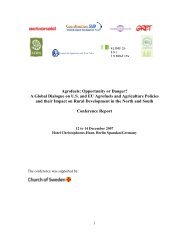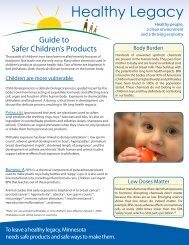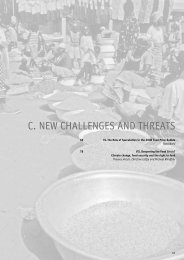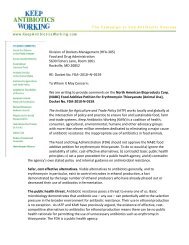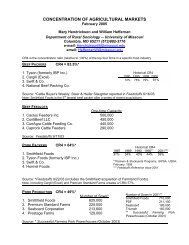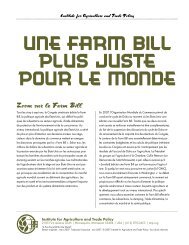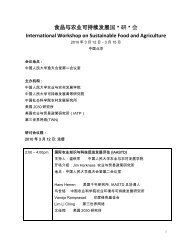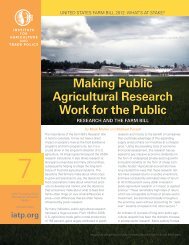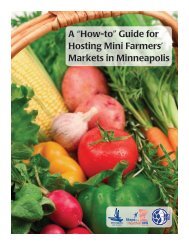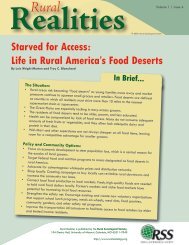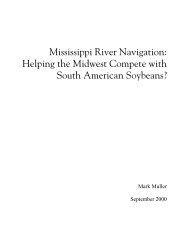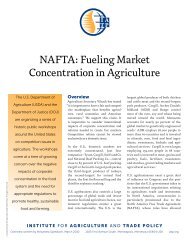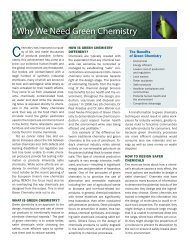IATP Hog Report - Institute for Agriculture and Trade Policy
IATP Hog Report - Institute for Agriculture and Trade Policy
IATP Hog Report - Institute for Agriculture and Trade Policy
You also want an ePaper? Increase the reach of your titles
YUMPU automatically turns print PDFs into web optimized ePapers that Google loves.
Section 5<br />
In nearly every case, as if there were a blueprint, the pattern of corporate<br />
invaders is similar. Dr. Laura DeLind describes this pattern succinctly in<br />
her summary of the grassroots protest by Farm Environment Defense<br />
Foundation (FEDH) against Jackson County <strong>Hog</strong> Producers (JCHP), a tensite,<br />
480 sow-per-site operation in Jackson County, Michigan. 141<br />
http://www.iatp.org/hogreport/sec5.html (27 of 38)2/27/2006 3:50:13 AM<br />
Although the FEDH won its battle, the victory was bittersweet. As the<br />
JCHP had presented itself as simply another beleaguered farming<br />
operation, the battle became "reinterpreted by agribusiness as an assault on<br />
the 'right to farm' of all farmers regardless of scale <strong>and</strong> organizational<br />
management." 142 This reinterpretation led to development of state right-tofarm<br />
guidelines that disadvantaged rural residents <strong>and</strong> smaller farmers.<br />
Further, the right-to-farm argument: 143<br />
recast a complex agro-environmental issue into an issue of<br />
individual entitlement. Within this context, it mystified the<br />
social <strong>and</strong> political dimensions of the original issue by<br />
reducing them to a set of technical problems (i.e., odor,<br />
surface water contamination) amenable to individually<br />
managed solutions. It likewise concealed the class<br />
divisions that were developing between corporate farmers<br />
<strong>and</strong> family farmers (<strong>and</strong> in this case rural residents<br />
generally) by polarizing producers <strong>and</strong> nonproducers,<br />
agriculturalists <strong>and</strong> environmentalists.<br />
Buried in the technical arguments that put the debates into the h<strong>and</strong>s of<br />
"experts" far removed from the consequences are the critical issues of the<br />
loss of state <strong>and</strong> local democracy <strong>and</strong> the capitulation of public institutions<br />
to corporate interests.<br />
The mixed outcome of the struggle in Jackson County, Michigan serves as<br />
a warning against allowing agribusiness to reduce the original issue to a<br />
set of technical problems, each of which can be solved individually. 144 As<br />
this report shows, the factory farm problem has many dimensions. It<br />
cannot be solved by the resolution of one or more individual technical<br />
problems.<br />
Some Strategies <strong>and</strong> Action Alternatives <strong>for</strong> Improving the<br />
Social Accountability of Animal Production<br />
1. Fight the activities of agribusiness <strong>and</strong> animal factory supporters<br />
that influence legislators to weaken state anticruelty statutes to<br />
allow practices, which would be considered cruel if applied to<br />
dogs or other pets, to be used with farm animals.<br />
Proactively, hold referenda or ballot initiatives to ban certain cruel



